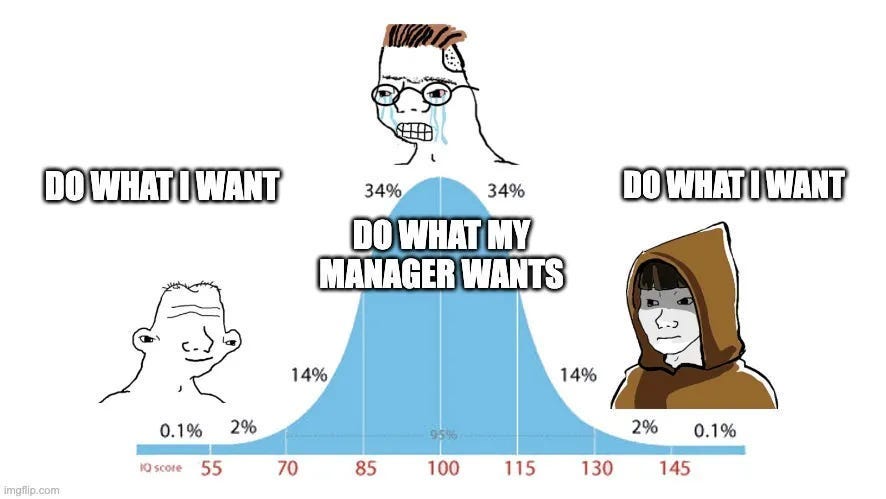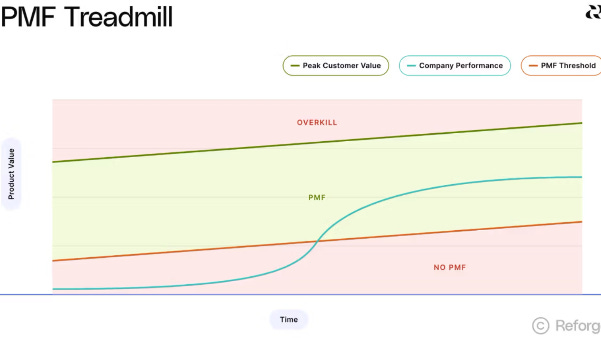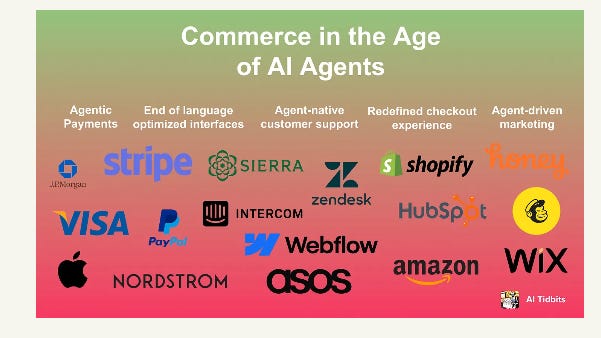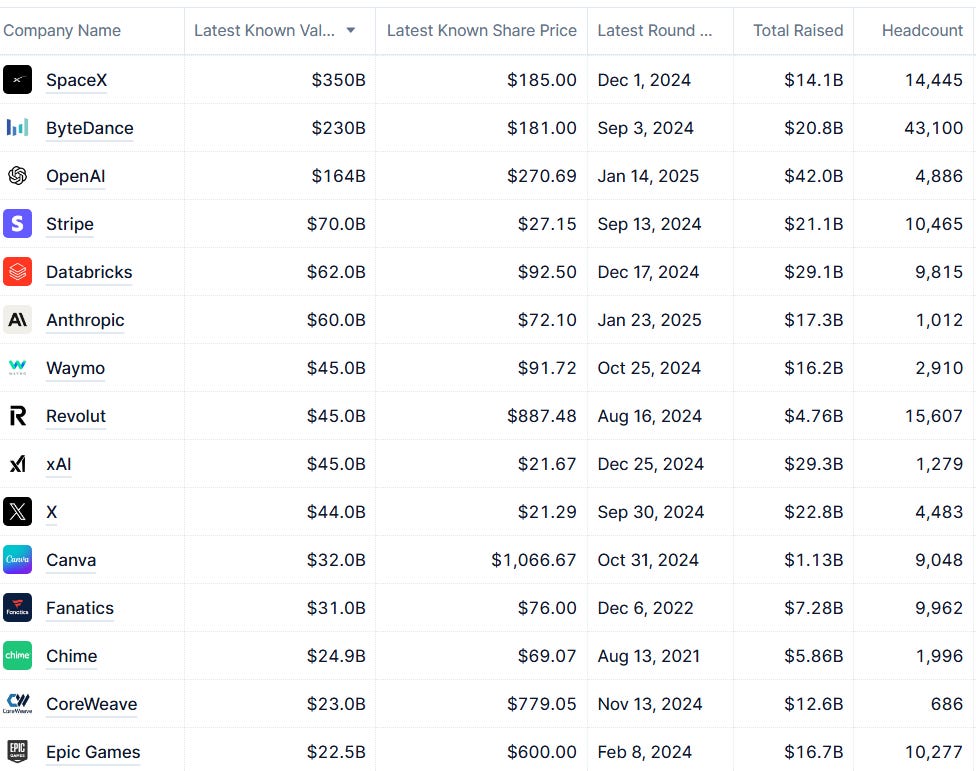el producto #421 🚀
DeepSeek shock & breach, Autonomous commerce, Big tech Q4 results, AI Agents for PMs, The state of private tech companies, Managing hierarchies at work & more
Hi folks 👋
Welcome to a new edition of el producto
🎰 The week in figures
$25B: SoftBank is reportedly committing up to $25B on OpenAI at a $300B valuation
$3.5B: IBM plans to cut $3.5B in 2025 through job cuts and redirect spending toward AI initiatives to grow AI revenue to $5B
$180M: ElevenLabs closed a massive $180M Series C. The AI voice startup is now valued at $3.3B, backed by a16z, ICONIQ, Sequoia, Salesforce Ventures, and more. With revenue estimates at $90M ARR, it’s scaling fast—but can AI-driven revenue prove durable?
1M: Meta apparently sold 1M Ray-Ban smart glasses last year, and could release a new pair with a full on heads-up display called Hypernova for later this year
💸 Q4 results
Apple reported Q1 earnings that exceeded expectations, driven by a +14% in services revenue to $26.34B. Overall revenue rose 4% YoY to a record $124.3B. However, iPhone sales dipped nearly 1% to $69.14B, missing projections, particularly due to challenges in the Chinese market. Despite this, the company saw significant growth in Mac and iPad sales, both rising over 15%
Meta beat Q4 forecasts, plans massive AI investment: Revenue: $48.39B, +21% YoY; Net income: $20.84B, +49%YoY; Operating income: $23.4B, +48% operating margin
Microsoft shares dropped despite revenue beat as cloud forecast, AI spending disappoints. Revenue: $69.6B, +12.3% YoY; Operating income: $31.7B, +17% YoY; Net income: $24.1B, +10% YoY; Cloud revenue: $40.9B, +21% YoY
📰 What’s going on
OpenAI has unveiled o3-mini, the latest addition to its reasoning model lineup. Designed to enhance logical problem-solving (specifically in STEM fields), o3-mini builds upon the capabilities of its predecessor, o1. The model is currently undergoing safety testing, with OpenAI inviting researchers to participate in evaluations before publicly launching later this year
The release of ChatGPT rival, R1, by small Chinese start-up DeepSeek, last week, has sent shockwaves through the global AI industry and stock markets, as it overtook ChatGPT as the most downloaded app in the US, prompting VC, Marc Andreessen, to call it “AI’s Sputnik moment,” but…
DeepSeek was forced to temporarily pause user registrations “due to a large-scale malicious attack,” and details have just emerged that this attack exposed over 1M log entries. Key points:
The exposed information was housed in a publicly accessible database—ClickHouse—and was discovered by security researchers who found it in “minutes,” with no authentication required
According to these researchers, ClickHouse contained sensitive information—including chat history, API secrets, backend details, and operational details—and attackers could also extract plaintext logins and local files
ClickHouse is typically an internal database as it "allows full control over database operations, including the ability to access internal data," which explains why the information was exposed so easily
Although DeepSeek swiftly secured the database (after it was informed there was an issue) it’s not known if malicious actors exploited the exposed data before it was secured, but according to researchers, “it wouldn’t be surprising, given how simple it was to discover”
Alibaba’s Qwen2.5-Max model beats DeepSeek V3, GPT-4o, Llama-3.1-405B “almost across the board"
Meta AI is launching the ability for its chatbot to “remember” certain details about you, such as your dietary preferences or interests. Memories will be limited to one-on-one chats (not group chats) and Meta says that it is on track to become the most used AI assistant
Google Gemini 2.0 Flash begins rolling out
Google is testing a feature—Ask for Me—that allows users (who have opted into Google’s Search Labs experiments) to use AI to call local businesses and ask about pricing and availability. The person receiving the call will hear an automated message from Google AI, saying it’s “calling on behalf of a user,” they can then give the bot a response, which Google will then send back to the user
Google cuts Android, Chrome, and Pixel Employees: In an effort to push full steam ahead on AI, Google has initiated a voluntary exit program for its U.S.-based Platforms and Devices team, encompassing employees working on Android, Pixel hardware, and related projects. This move follows the 2024 merger of Google's Android and hardware teams, pushing to accelerate AI integration. This move reflects a strategic shift in both budgets and priorities, underscoring the heightened focus on AI innovation
Google Sheets can now do more complex data analysis, thanks to Gemini. Up until now, the Gemini integration has been pretty underwhelming but Google has gradually started to roll out more improvements. This week, it has added the ability to generate insights from data in Gemini and to transform those insights into visual graphs. Graphs can be added directly to Google Sheets - but only as images
Alphabet’s Waymo effort is looking to expand greatly in 2025. Waymo is sending autonomous vehicles to 10 new cities in 2025, starting with Las Vegas and San Diego. Waymo faces competition from both domestic and foreign self-driving companies but seems set on not ceding market leadership any time soon
X partnered with Visa to integrate Visa’s payment solutions into X Money’s wallet to launch the "X Money Account," a wallet and p2p payment service. This is a step towards transforming X into an "everything app," offering services beyond social networking. The X Money Account will enable users to fund their X wallet, link debit cards, and transfer funds to bank accounts using Visa Direct. Initially available to U.S. users, the service is expected to roll out later this year
iPhone iOS 18.3 gets access to Starlink's satellite network for off-grid communication. While it's text-only for now, SpaceX and T-Mobile plan to add voice calls and data in the future
Leaked code suggests Uber is working on a price-lock feature that would allow users to purchase a monthly pass for $2.99 and avoid any surge pricing
Block’s CEO Jack Dorsey has released a new tool called Goose which is designed to help engineers speed up productivity by using AI agents to automate tasks. It lets users choose their own LLM provider and uses what it calls “Extensions”. These allow users to connect agents to tools like Google Drive, GitHub and other products. Block says non-engineering use cases are also in the exploration phase
📚 Good reads
aigents.pm: Pawel Huryn shares free AI Agents for Product Managers to generate PRD, review your resume, or develop a winning Product strategy. Nice and fun experiment!
The valuable employee paradox, by Julie Zhuo:
Every great manager I know tells me that the reports they find most valuable are the ones who convince them to do things differently.
However, most reports believe they are most valuable when they do what their manager wants.
How do we circle this square?
Your Product Market Fit could be gone soon. According to Reforge, today’s AI-driven hyper-competition makes the Product market no longer a fixed milestone but an ongoing, dynamic challenge, especially for specific categories of services. It’s a timely reminder that organizations must continuously align their Product, market, and operational strategies to thrive. This is a powerful call for platform and Product leaders to rethink how to sustain fit in ever-changing ecosystems in the face of AI
Charting the way forward in the Agentic web. Kenneth’s insights dive into integrations, how they could change (being optimized for AI agents), and how service providers' approaches might have to evolve in a world dominated by agentic systems. The framework explores crucial questions about building value networks, balancing agency across systems, and the strategic implications for developers and platforms. Complement with the latest from NFX on the framing of AI Agents in organizations
Autonomous commerce can spell the end of human-centric transactions. Sahar Mor presents a compelling vision of how AI agents will transform e-commerce by enabling autonomous decision-making and agent-to-agent interactions. "Rather than looking for signs of human behavior, we'll need systems that verify agent legitimacy, authorization scope, and decision-making logic," - challenging the current paradigm of human-centric verification systems. We always get excited about what AI can power in Product design and development and tend to forget its tremendous impact on UX and the Consumer
Prompt-driven development (PDD). Andrew Miller explains how PDD represents a shift from syntax fluency to architectural understanding. By leveraging LLMs, developers and non-developers alike can build functional products faster and more efficiently. However, the quality of LLM-generated code depends heavily on the clarity and specificity of prompts, making communication and strategic thinking critical skills
State of private markets. CJ Gustafson shares an insightful analysis of the valuation of private tech companies, hiring patterns, and company layoffs
That’s a wrap for this week! 🌟
I’d love to hear your thoughts—what stood out to you, and how are you thinking about integrating these insights into your product strategy? Reply to this email or drop a comment on Substack to share your take. And if you found this valuable, forward it to a fellow PM or product enthusiast who’d enjoy the read
See you next week! 👋
Angel








